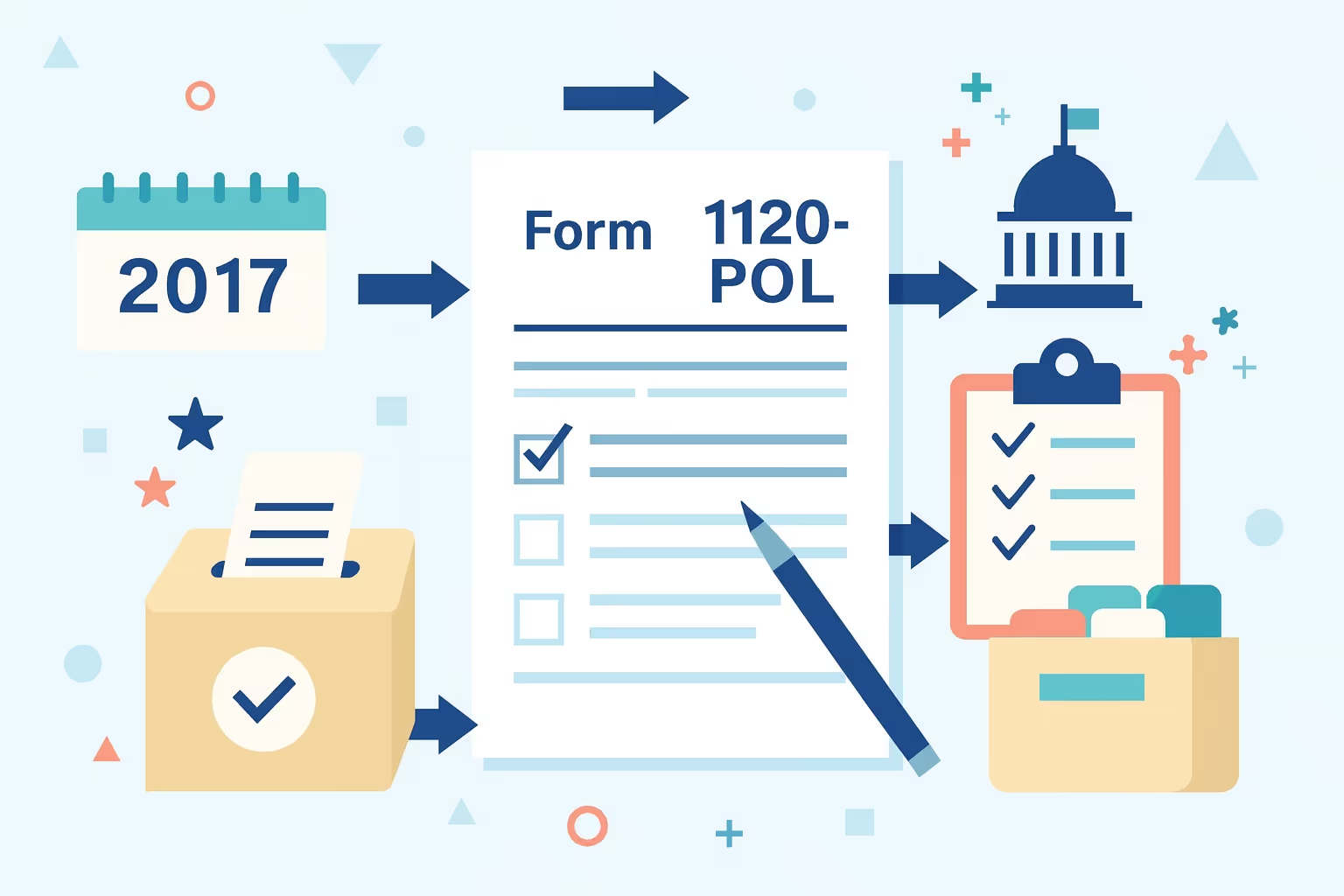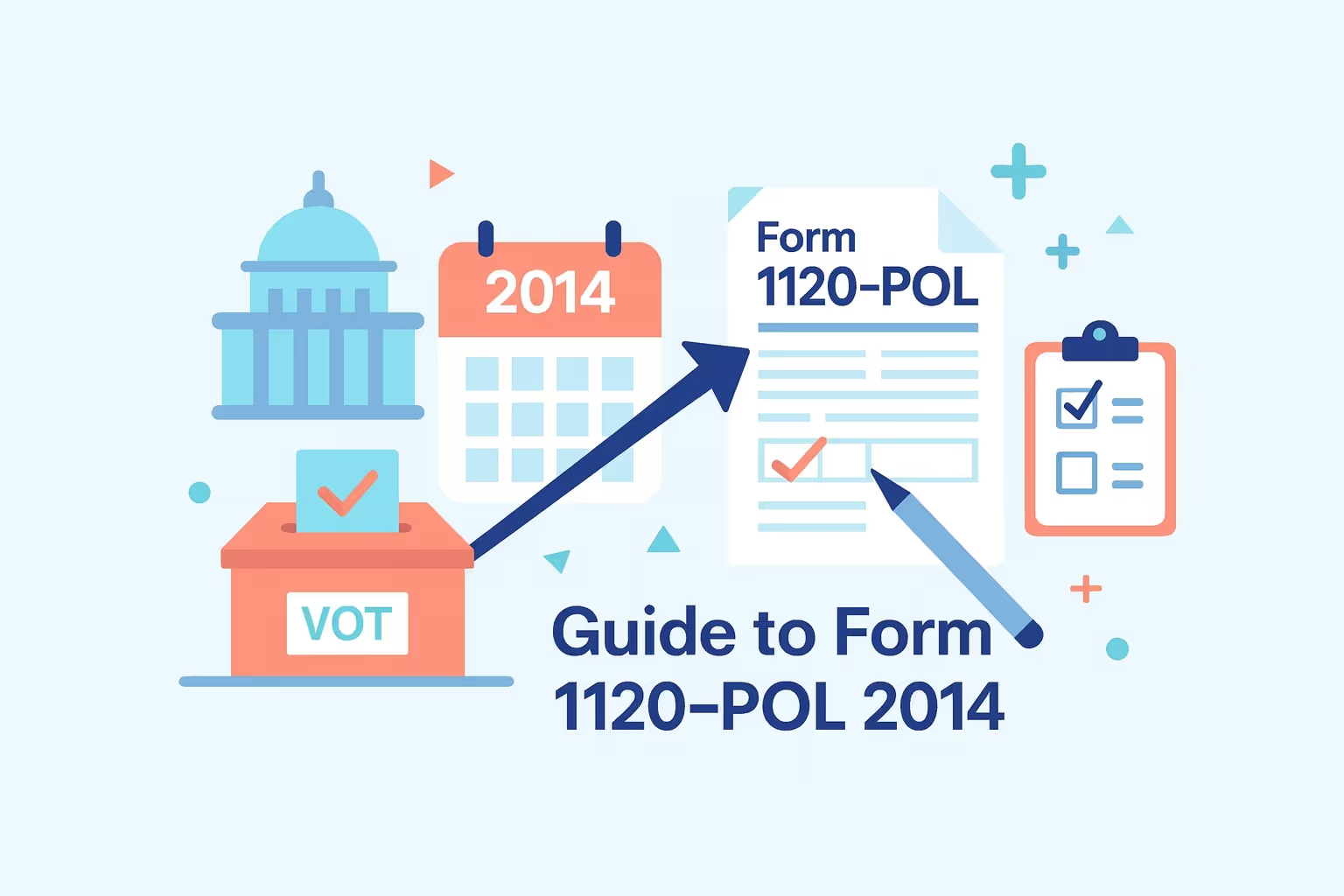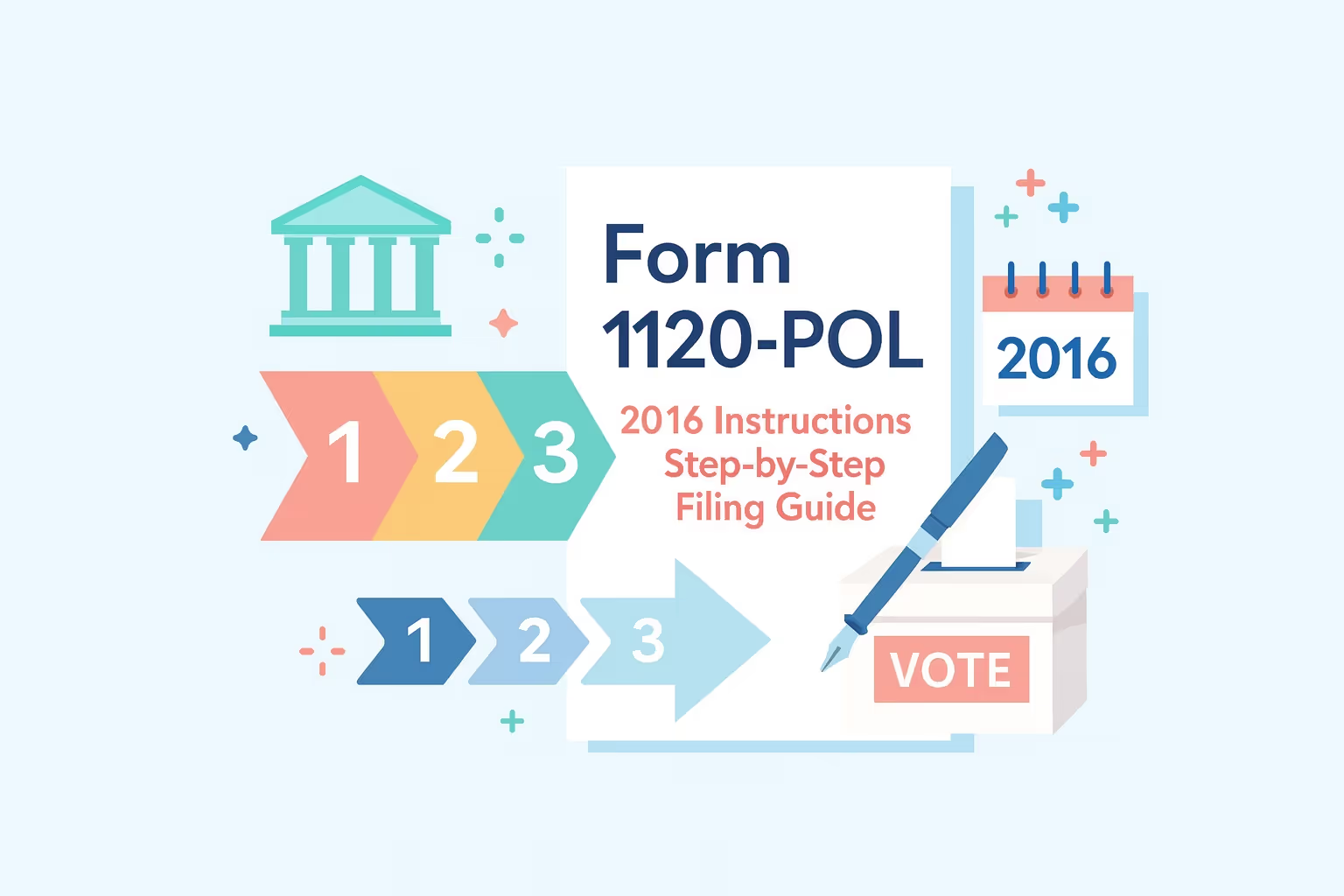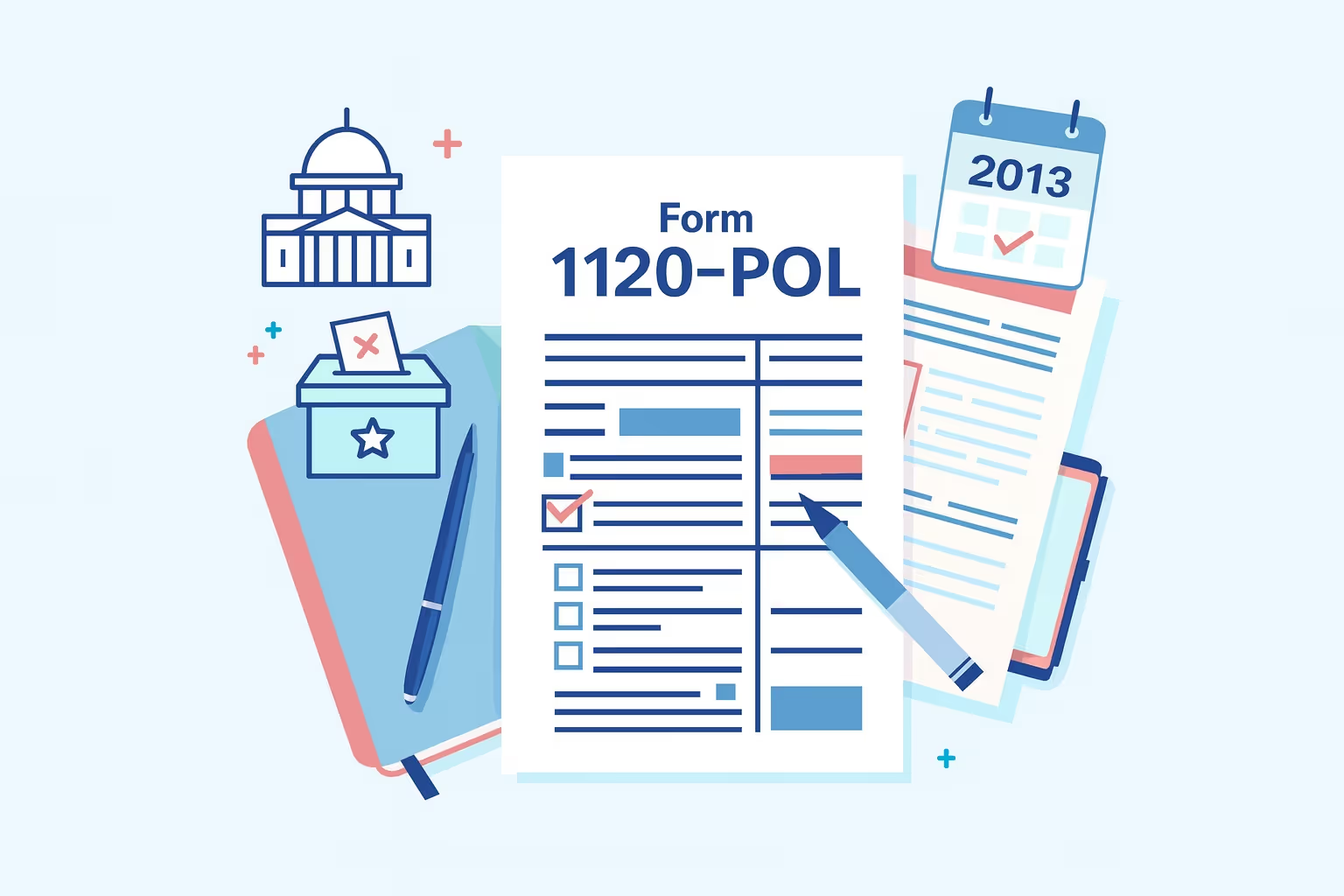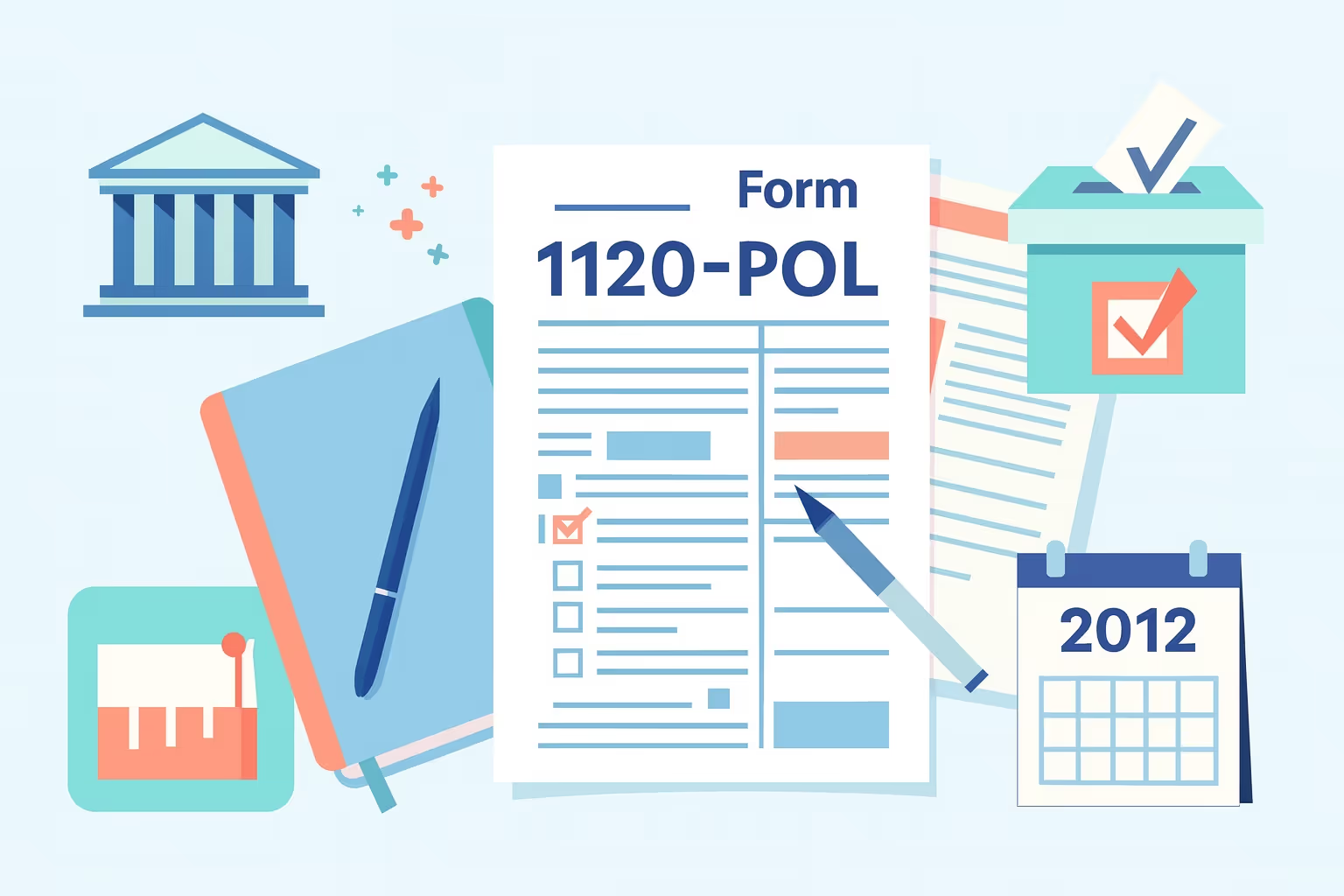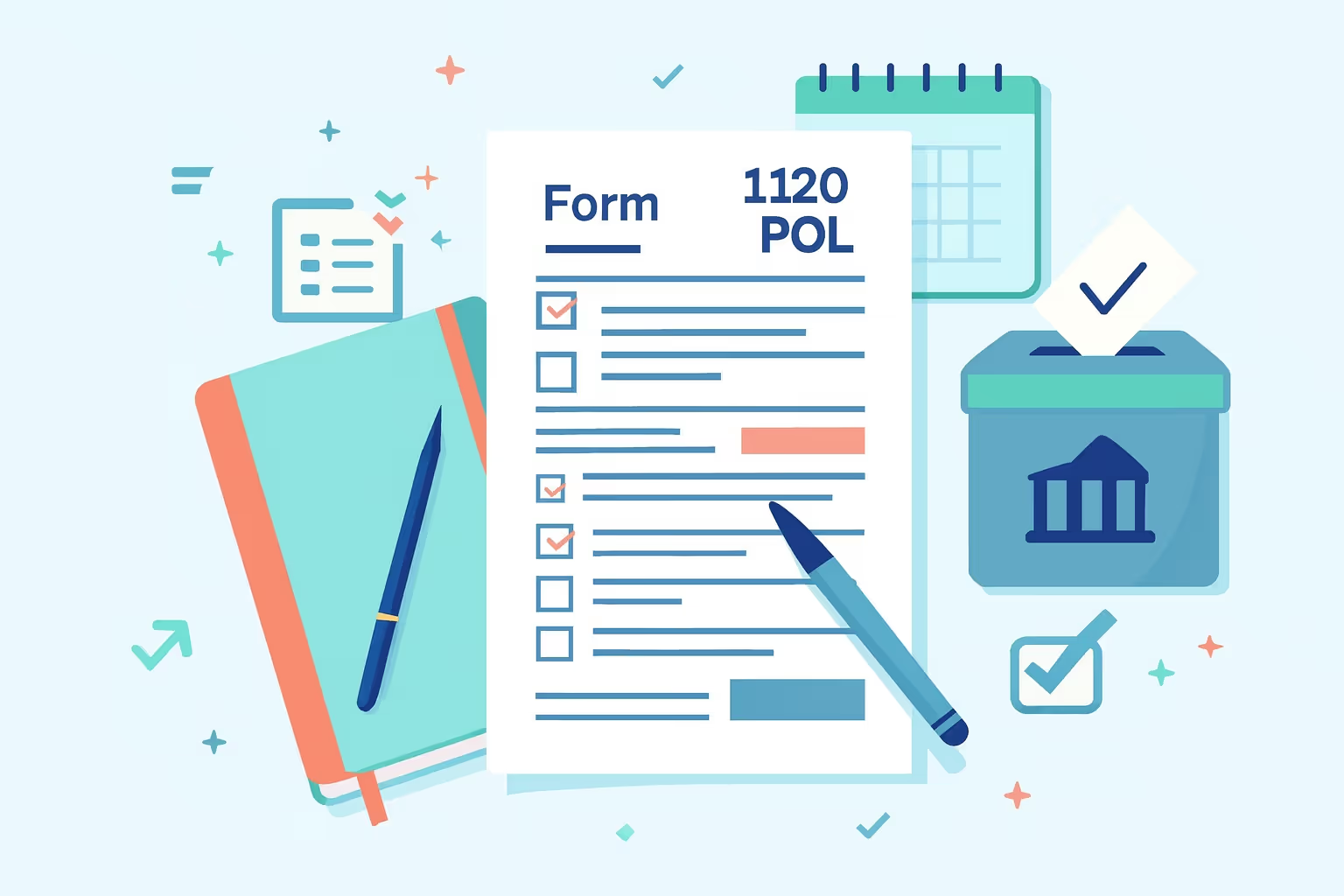
Form 1120-POL (U.S. Income Tax Return for Certain Political Organizations) is the federal income tax form that political organizations use to report taxable income to the Internal Revenue Service (IRS). These organizations, established under Section 527 of the Internal Revenue Code, include political parties, campaign committees, and political action committees (PACs). The form helps the IRS verify that income unrelated to a group’s exempt political activities—such as investment gains or business income—is properly reported and taxed.
Political organizations must file Form 1120-POL for the 2023 calendar year if they have any taxable income, even if the amount is small. Filing this form ensures compliance with federal tax laws and maintains transparency for organizations engaged in elections or issue advocacy. Completing the Form 1120 POL 2023 instructions carefully helps avoid penalties and delays from errors or missing schedules.
This simplified guide provides step-by-step instructions based on official IRS resources. It’s written for first-time and experienced filers who need clear, accessible guidance on meeting the IRS filing due date, reporting taxable income, and following current e-filing requirements. This information is for general educational purposes only and should not replace professional tax or legal advice.
Understanding Form 1120-POL
Form 1120-POL is the U.S. Income Tax Return for Certain Political Organizations. Political groups use it to report taxable income and calculate any resulting tax liability under the Internal Revenue Code Section 527. Unlike other IRS tax forms, this one applies only to organizations whose income is partly or wholly unrelated to their exempt political activities. You can view the current version of the form and its official instructions on the IRS website.
1. What Form 1120-POL Is Used For
Form 1120-POL serves a specific purpose within the federal income tax return process:
- Reporting taxable income: Political organizations must report investment income, capital gains, and other income not directly connected to their political purpose.
- Calculating tax owed: The form determines how much federal income tax the organization owes on its taxable income.
- Maintaining compliance: Filing accurately helps organizations demonstrate compliance with IRS regulations, which supports their standing as exempt political entities.
- Differentiating from other forms: Unlike Forms 8871 and 8872, which notify the IRS of organizational status and disclose contributions or expenditures, Form 1120-POL focuses solely on annual taxable income reporting.
2. Who Must File
Organizations required to file Form 1120-POL include:
- Political parties and committees: These include campaign committees, political action committees (PACs), and similar groups organized under Section 527.
- Exempt organizations with taxable income: Even if an organization operates primarily for political purposes, it must file if it earns income from unrelated business activities or investments.
- Threshold criteria: Filing is required when an organization has political organization taxable income or usually receives gross receipts of $25,000 or more.
3. Filing Deadlines and Period
Understanding the filing period for the calendar year and due dates is essential for compliance:
- Regular due date: For the 2023 tax year, returns are due March 15, 2024, for calendar-year filers.
- Extensions: Political organizations can request an automatic six-month extension by filing Form 7004, moving the deadline to September 15, 2024.
- Timeliness and penalties: Late filings may result in fines, even if the organization owes no tax. Submitting the return electronically before the due date ensures timely compliance and confirmation of receipt.
By understanding these fundamentals, political organizations can properly complete their Form 1120-POL 2023 instructions, meet IRS due date requirements, and maintain accurate records for future filing periods.
What’s New for 2023
For the 2023 tax year, the IRS made several updates to Form 1120-POL and its filing requirements. These changes focus on improving accuracy, promoting electronic filing, and ensuring organizations use current forms and schedules. Below are the most notable updates political organizations should review before filing:
- Mandatory electronic filing: The IRS now requires political organizations that file 10 or more returns or have $10 million or more in assets to file Form 1120-POL electronically. This change, effective for tax years ending on or after December 31, 2023, ensures faster processing, confirmation of receipt, and reduced errors.
- Updated credit reporting: Line 21 on the form now clearly reports tax credits, including the foreign tax credit and general business credit. This change simplifies how organizations apply credits to offset their total tax liability.
- Revised schedules and payment documents: The IRS updated related schedules, payment vouchers, and signature forms (such as Form 8453-TE). These updates standardize electronic submissions and maintain consistency across all IRS tax forms.
- Effective date and compliance reminder: These changes apply to returns for the 2023 calendar year and beyond. Organizations should verify they are using the latest instructions before preparing their income tax return. For the most recent version of the form, visit the IRS Form 1120-POL page.
Step-by-Step Instructions for Completing Form 1120-POL
The following section provides a structured, beginner-friendly approach to completing Form 1120-POL. Each step outlines what information to include, how to report it, and what records to maintain for accuracy and compliance with IRS requirements.
Step 1—Gather Key Information
Gather all necessary financial and organizational details before filling out the form.
- Confirm identification details: Verify the organization’s legal name, mailing address, and Employer Identification Number (EIN). These must match the information previously reported to the IRS.
- Identify the correct tax period: Determine whether you are filing for a calendar year ending in 2023 or a fiscal year ending on a different date.
- Collect financial records: Gather bank statements, brokerage account summaries, and other documents showing interest, dividends, and capital gains.
- Compile deductible expense information: Keep detailed records of investment fees, professional services, and other expenses related to producing taxable income.
Step 2—Complete the Header Section
This section provides the IRS with your organization’s identification and filing period.
- Enter the full organization name, EIN, and complete address.
- Indicate the tax period clearly, whether calendar or fiscal year.
- Check the box if this return is final or amended.
- Ensure all information matches prior information returns to avoid delays or correspondence from the IRS.
Step 3—Report Income (Lines 1–11)
Accurately report all taxable income as defined under the Internal Revenue Code.
- Include taxable income sources: Report interest, dividends, capital gains, rental income, and income from unrelated business activities.
- Exclude political contributions: Donations received for political purposes are generally not taxable income.
- Attach supporting schedules: If your organization reports capital gains or losses, attach Schedule D (Form 1120).
- Double-check classifications: Ensure all entries correspond with line instructions in the official IRS form to avoid misreporting.
Step 4—Calculate Deductions (Lines 12–19)
This section allows political organizations to reduce taxable income through allowable deductions.
- Deduct eligible expenses: Include only expenses directly related to generating taxable income—such as investment management fees, custodial costs, and accounting services.
- Exclude political expenses: Costs associated with campaigning, lobbying, or election-related activities cannot be deducted.
- Maintain documentation: Each claimed deduction should be supported by receipts, invoices, or financial statements showing the date, amount, and purpose.
Step 5—Compute Tax Liability (Lines 20–30)
Calculate the amount of tax your organization owes after deductions.
- Apply corporate tax rates: Political organization taxable income is subject to the same tax rates that apply to corporations.
- Account for applicable credits: Apply credits such as the general business credit or foreign tax credit if eligible.
- Review calculations carefully: Mathematical errors are common filing issues. Recheck totals to ensure the tax return and all schedules align.
Step 6—Determine Payments and Balances
This step summarizes payments made and determines if additional tax is due.
- Include all prior payments: Add estimated tax payments, credits, or overpayments carried forward from previous years.
- Compute the final balance: Subtract payments from the total tax liability to determine whether a balance is due or a refund is expected.
- Choose your payment method: You may pay electronically through IRS Direct Pay, the Electronic Federal Tax Payment System (EFTPS), or by check if filing by mail.
- Retain proof of payment: Keep confirmations or check copies with your records for verification.
Step 7—Verify and Submit the Return
- Check for completeness: Review all entries, ensure signatures are included, and confirm that all required schedules and other forms are attached.
- File electronically if required: Organizations that file ten or more returns or hold assets of $10 million or more must submit Form 1120-POL electronically.
- Observe filing deadlines: The 2023 income tax return is due March 15, 2024. However, using Form 7004, extensions may be requested to September 15, 2024.
- Maintain organized records: Keep all filing documentation, including income reports, deduction details, and payment confirmations, to support compliance and simplify future filings.
By following these steps, political organizations can accurately complete Form 1120-POL, meet IRS filing deadlines, and maintain compliance with federal tax laws under Section 527.
Filing Options—Electronic vs. Paper
Political organizations filing Form 1120-POL can submit their income tax return electronically or by paper. Each method has specific requirements and advantages that help ensure accuracy, compliance, and timely IRS processing.
Electronic Filing (E-File)
Electronic filing is preferred for most organizations and mandatory for larger ones.
- Who must e-file: This requirement applies to organizations that file ten or more information returns annually or hold assets totaling $10 million.
- How to e-file: Use IRS-approved software or an authorized provider. Ensure the Employer Identification Number (EIN) and tax period match IRS records.
Paper Filing
Smaller or low-activity political organizations may file by mail.
- Who may file: Organizations with fewer than ten annual returns and assets under $10 million.
- How to file: Download the latest Form 1120-POL and instructions, complete clearly in black ink, attach required schedules, and mail with payment to the correct IRS address using certified mail. Retain copies for future tax filings.
Paying Your Form 1120-POL Tax
Once a political organization completes Form 1120-POL, the next step is determining how to pay any tax liability owed. The IRS requires payment by the original filing due date, even if the organization receives an extension to file the return. Understanding the available payment methods helps ensure timely compliance and avoids unnecessary penalties.
Payment Due Date
For the 2023 calendar year, the income tax return and payment are due on March 15, 2024. Political organizations that file for an extension using Form 7004 must still pay any owed taxes by this original deadline. Payments made after the due date may result in interest and late-payment penalties.
Payment Options
Political organizations can choose from several IRS-approved payment methods. Each option provides secure and verifiable ways to settle federal tax obligations.
- Electronic Federal Tax Payment System (EFTPS). This free online service lets organizations make one-time or scheduled payments directly from a bank account. Using EFTPS helps maintain accurate records and provides confirmation numbers for tracking expenses.
- IRS Direct Pay. Organizations can make same-day payments directly from their checking or savings accounts. This method is convenient for filers who do not use EFTPS.
- Check or money order. Payments made by mail must be payable to the United States Treasury. The filer should include the organization’s Employer Identification Number (EIN), the form number, and the tax period on the check’s memo line.
- Credit or debit card. The IRS accepts card payments through approved third-party processors, though processing fees may apply.
Estimated Tax Payments
Organizations expecting to owe $500 or more in income tax for the year must make estimated tax payments quarterly. Making these payments helps prevent underpayment penalties.
Quarterly payment schedule for 2024:
- 1st Quarter: April 15, 2024—covers January through March
- 2nd Quarter: June 17, 2024—covers April through May
- 3rd Quarter: September 16, 2024—covers June through August
- 4th Quarter: January 15, 2025—covers September through December
Each payment should be calculated based on the organization’s projected taxable income and submitted electronically when possible.
Avoiding Penalties and Maintaining Records
Organizations can avoid late fees by paying the full tax owed by the due date or by ensuring that at least 90% of the current year’s tax liability (or 100% of the prior year’s liability) has been paid through estimated payments. Payment confirmations and supporting documentation should be stored with the organization’s financial records for future verification.
Timely and accurate payment of Form 1120-POL taxes helps maintain good standing with the IRS and demonstrates responsible financial management under the Internal Revenue Code for political organizations.
Required Schedules and Supporting Forms
Filing Form 1120-POL often requires attaching additional schedules and supporting documents to complete a full political organization report. These forms provide the IRS with detailed information about income, deductions, and other related activities. Attaching the correct schedules helps prevent processing delays and ensures your organization can quickly respond to any IRS follow-up.
Commonly Required Schedules and Forms
- Schedule D (Form 1120)—Capital Gains and Losses: This schedule reports profits or losses from the sale of investments or other sources of income. It is required if the political organization earned capital gains or disposed of assets during the tax year.
- Form 4562 – Depreciation and Amortization: This form allows deductions for business property depreciation and intangible asset amortization. It applies when an organization owns depreciable property, such as computers or office equipment.
- Form 3800–General Business Credit: This form consolidates multiple business credits. It should be included if the organization is eligible for credits based on its activities or expenditures.
- Form 4720 – Return of Certain Excise Taxes: This form is used when the organization is subject to excise taxes, such as nomination or election-related expenditures.
- Form 8453-TE – E-file Signature Document: This document is required to authenticate electronic filings. Including it ensures successful verification of the waiting status when submitting returns online.
- Form 8868 – Application for Extension of Time to File: This form allows political organizations to request a filing extension if completing the return on time would cause undue hardship.
Maintaining Compliance and Documentation
To maintain compliance, filers should:
- Review the latest information and updates published on the IRS website before filing.
- Schedule an internal appointment with financial or tax advisors to confirm which forms and exemptions apply to the organization.
- Keep organized digital and paper copies of all supporting schedules, including receipts and transaction statements, for at least three years after filing.
Completing and attaching the appropriate schedules ensures the IRS has full insight into your organization’s taxable activities. This process supports accurate reporting and efficient review for organizations involved in campaigns or activities related to a local public office.
Common Filing Errors and How to Avoid Them
Even with clear instructions, many political organizations make avoidable mistakes when filing Form 1120-POL. Recognizing these common errors can help ensure accuracy, prevent penalties, and maintain a smooth review process with the IRS. Every organization should review its return carefully before submission to confirm that all figures are correct and that supporting schedules are correctly attached.
Frequent Mistakes to Watch For
- Reporting political contributions as taxable income: Contributions received for campaign or political purposes are not taxable and should not be included as income. Only investment earnings or unrelated business income should appear on the income tax return.
- Leave lines or schedules are incomplete: Missing entries or unfiled attachments can cause processing delays. Always check that each return page is completed and signed before submission.
- Using incorrect identification information: Entering the wrong Employer Identification Number (EIN) or organization name can disrupt IRS record matching and cause errors during processing.
- Failing to use electronic filing when required: Organizations that meet the e-filing threshold must file electronically. Doing so ensures smoother submission and quicker confirmation once the system verifies the return.
- Mathematical and calculation errors: Incorrectly totaling deductions or credits can alter the taxable income figure and result in IRS notices. Review all calculations or use approved software to validate accuracy.
- Missing payment or underpayment: Failure to pay the full tax due by the deadline may lead to interest or penalties. Always confirm the correct payment amount before submitting the return.
Best Practices to Prevent Mistakes
- Review the official IRS instructions for Form 1120-POL to ensure the organization meets all requirements.
- Verify that all communications go through the proper agency channels or authorized representatives to maintain a clear connection with the IRS.
- Before filing, have a team member or advisor check for inconsistencies or omissions. A fresh review helps identify errors automated systems might miss.
- Keeping copies of filed returns, payment receipts, and correspondence supports transparency and accountability, especially if questions arise later.
By following these best practices, political organizations can reduce filing mistakes and stay compliant, preventing problems affecting future interactions with the IRS or the processing times related to a specific EIN or tax return submission.
Special Situations—Zero Activity or Final Returns
Political organizations with no income during the year may still need to file Form 1120-POL to stay compliant with the Internal Revenue Code. A zero-activity return should report “0” on all income and deduction lines while confirming the organization’s active status.
Groups that dissolve must file a final return, reporting all income and deductions through the closing date and marking the form accordingly. Filing on time prevents penalties, maintains transparency, and confirms that the organization has met all federal tax liability requirements before ending its operations with the IRS.
First-Time Filer Guidance
For organizations filing Form 1120-POL for the first time, the following steps help ensure accuracy, compliance, and smooth processing:
- Begin by obtaining an EIN: Apply for an Employer Identification Number (EIN) using Form SS-4 and confirm the organization’s Section 527 status with the IRS.
- File initial notices and reports: Submit Form 8871 to notify the IRS of your organization’s intent and Form 8872 to report political contributions and expenditures.
- Maintain complete records: Keep organized documentation of all income, expenses, and bank transactions to support accurate reporting.
- Verify electronic submission: Review all entries carefully to ensure successful verification while waiting for your return to be filed electronically.
- Use human review: Have someone double-check your return for clarity and consistency to prevent processing delays, errors, or Ray ID mismatches that could influence IRS validation.
Frequently Asked Questions (FAQs)
Who Must File an Income Tax Return Using Form 1120-POL?
All political organizations with taxable income must file Form 1120-POL with the IRS. This includes political parties, campaign committees, and PACs under Section 527. Filing an income tax return ensures compliance with federal reporting requirements and proper payment of taxes on income unrelated to the organization’s exempt function during the calendar year.
What Is the Purpose of This Tax Return?
Form 1120-POL is the required tax return for political organizations earning taxable income. It reports investment income, capital gains, and allowable deductions. Submitting the form keeps organizations compliant with IRS rules governing income tax and confirms that taxable earnings unrelated to political operations are reported accurately within the designated calendar year.
Which Tax Forms or Schedules Should Be Included?
Depending on financial activity, organizations may need additional tax forms or schedules to complete their filing. These can include Schedule D for capital gains and Form 4562 for depreciation or amortization. Attaching all other relevant forms ensures the submission is complete, accurate, and processed efficiently, preventing unnecessary correspondence or delays from the IRS after submission.
What Are the Filing Deadlines for Political Organizations?
Most political organizations using a reporting period based on the calendar year must file Form 1120-POL by March 15, 2024. Organizations can file Form 7004 to request a six-month extension if additional time is needed. However, any income tax owed must still be paid by the original due date to avoid interest and penalties under IRS regulations.
Can Political Organizations File Their Tax Return Electronically?
Yes, eligible political organizations can file their tax return electronically, and those submitting ten or more returns annually must do so. Electronic filing allows faster confirmation, minimizes calculation errors, and provides greater accuracy for returns filed during the calendar year. E-filing also helps the IRS process income tax payments and related documentation promptly.











